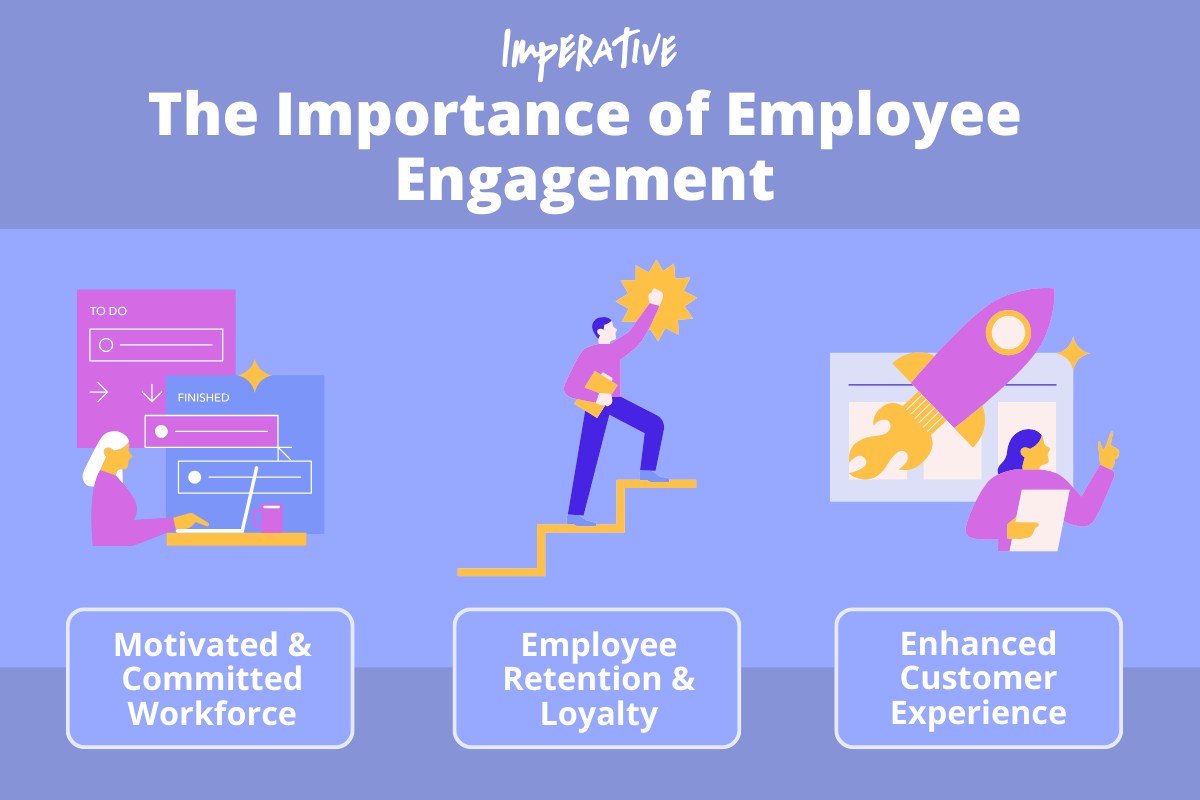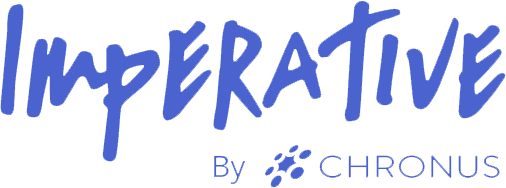Employee Engagement Software
How Employee Engagement Software Can Revolutionize Your Approach to Engagement
What This Article Covers:
In the dynamic landscape of modern workplaces, fostering employee engagement isn’t just a nice-to-have; it’s a true need.
At Imperative, we understand what drives employees to engage and the critical role that engagement plays in organizational growth. Our software platform is a cutting-edge employee engagement solution that helps employees connect to their purpose and actively empowers your organization to cultivate a positive company culture of engagement, productivity, and growth.
Imperative software’s primary features — AI-powered employee matching, science-backed conversations, and data-driven insights — are your best bet for building stronger teams, eliminating silos, boosting collaboration, and improving employee retention.
What Is Employee Engagement?
Employee engagement in today’s modern workplace is a strategic framework designed to shape and amplify the people of an organization. At its core, employee engagement is a choice that each employee makes every day. It’s the willingness to apply ourselves toward achieving positive outcomes for the organization we work for. This is visible through our actions and it encompasses our energy, intellect, intent, and behavior. The practice of employee engagement now includes use of digital advancements — representing a shift in the way companies approach the concept — providing a holistic, dynamic, and results-driven approach.
Traditionally, employee engagement consisted of occasional surveys and yearly performance evaluations. Organizations attempted to gauge employee sentiment through one-off, static assessments, leaving little room for continuous improvement or proactive intervention. This outdated approach often resulted in missed opportunities to harness the full potential of a company’s most valuable asset: its workforce.
Imperative reimagines the entire paradigm. We recognize that employee engagement is not a one-time event but an ongoing journey that requires constant nurturing and adaptation.
Why Is Employee Engagement Important?
Employee engagement is not just a buzzword or a feel-good concept — it’s a strategic imperative for any organization that aims to thrive in today’s competitive business landscape.
But why is employee engagement crucial? It is about fostering a profound connection between employees and their work. It’s the emotional commitment that drives individuals to invest their discretionary effort, go above and beyond, and genuinely care about business success.
- Motivated and committed workforce: Engaged employees are more than just passive participants in their jobs; they are active contributors who feel a sense of ownership in their roles. This intrinsic motivation translates into increased job satisfaction and a strong desire to excel.
- Employee retention and loyalty: Organizations with engaged employees experience lower turnover rates. Engaged employees are less likely to seek opportunities elsewhere because they find fulfillment and purpose in their current roles. This not only saves on recruitment and onboarding costs but also promotes stability within the workforce.
- Enhanced customer experience: Engaged employees are more likely to deliver exceptional customer service. Their enthusiasm and commitment translate into positive customer interactions, fostering brand loyalty and driving revenue growth.

Promotes Productivity
Engaged employees are the engine that drive productivity within an organization. When emotionally invested in their work, employees become more focused, efficient, and innovative.
- Increased output: Engaged employees are more productive. They put in extra effort to achieve their goals, resulting in higher output and improved overall performance.
- Innovation and creativity: Engagement encourages employees to think outside the box and bring fresh ideas to the table. They are more likely to participate in problem-solving, driving innovation, and helping the organization stay competitive.
- Efficiency: Engaged employees are not only more productive but also more efficient. They waste less time on unproductive activities and are more committed to completing tasks on time.
Ensures Better Communication and Alignment
Effective employee communication is the backbone of any successful organization. Engaged employees are more likely to communicate openly, collaborate effectively, and align with the company’s mission and values.
- Open channels of communication: Engagement encourages employees to share their ideas, concerns, and feedback. This open dialogue promotes a culture of transparency and trust.
- Team collaboration: Engaged employees are more likely to collaborate with their colleagues. They actively seek opportunities to work together, breaking down silos and fostering a sense of unity within the organization.
- Alignment with organizational goals: Engaged employees understand the company’s objectives and how their roles contribute to achieving them. This alignment ensures that everyone is working towards a common purpose.
Facilitates Business Strategies
A well-engaged workforce is a strategic asset that empowers organizations to execute their business strategies effectively. Here’s how employee engagement supports strategic initiatives:
- Change management: Engaged employees are more adaptable to change. They embrace new strategies, processes, and technologies, making it easier for the organization to implement and sustain change initiatives.
- Customer-centric approach: Organizations that prioritize employee engagement often adopt a customer-centric approach. Engaged employees are more attuned to customer needs and are committed to delivering exceptional experiences.
- Talent development: Engagement is closely tied to talent development and succession planning. Organizations can identify high-potential employees and invest in their growth, ensuring a pipeline of capable leaders.
- Competitive advantage: Engaged employees give your organization a competitive edge. They are more committed to delivering high-quality products and services, which can lead to increased market share and profitability
Key Features of Effective Employee Engagement Software
Innovative employee engagement tools, like the Imperative platform, should offer a comprehensive suite of features that revolutionize how organizations nurture and enhance their workforce’s engagement. These tools go beyond traditional methods, embracing innovation and digital advances to empower companies to create vibrant, motivated, and committed teams.
Personalized to the Each Employee
Each employee’s role, strengths, and experiences are unique and result in different engagement needs and challenges. The most effective employee engagement softwares will address the variation in individual employee’s experiences through leaning into personalization – allowing engagement strategy to be both highly personalized and highly scalable. When employees feel seen and heard, it allows them to explore their strengths and challenges and approach their engagement in a way that will work for them. Innovative approaches to employee engagement include:
- Individual goal alignment: Connecting employees with their intrinsic work motivation and strengths is an essential component to unlocking engagement. When employees understand how to apply their unique strengths at work, they can achieve lasting alignment and fulfillment within the organization.
- Unique career pathing: Continuous reflection and ongoing support from leadership supports the creation of personalized development plans. Employees should be empowered to set and take actions that make progress toward growth and achievable milestones.
- Ongoing dialogue of accountability: Effective engagement is a process of continuous feedback that establishes a culture of ongoing dialogue between employees and managers. It moves beyond the constraints of annual performance reviews, fostering a dynamic exchange of ideas and insights between peers.
Imperative Tip: The Imperative platform launches each employee experience with an assessment to better understand their individual strengths and needs, and integrates these personalized insights throughout guided conversations.
Beyond Employee Surveys
While employee surveys are a cornerstone in most organization’s employee engagement strategies, simply understanding where engagement is at during a single point in time isn’t enough to achieve engagement goals. Traditional surveys may offer a way for organizations to gather feedback from their workforce, but it’s the steps that an organization takes to address survey results that actually levels up employee engagement. Innovative engagement softwares help move the needle on engagement metrics by:
- Real-Time measurement: Involving employees in the survey process over time illustrates employees’ engagement journey beyond simply how they’re feeling at a singular moment. Conducting regular surveys allows organizations to measure the impact of their engagement efforts over time.
- Customized engagement initiatives: Effective employee engagement strategies should be tailored to address specific areas of concern or interest, and provide unique data to understand and track the progression of that initiative.
- Customized & continuous: Collecting unique metrics from employees across teams, seniorities, and geographic locations helps pinpoint engagement challenges.
Employee-Centric Structure
The first step in any organization’s engagement journey is bolstering employee interest and willingness to change their engagement at work. Effective employee engagement software will make the engagement process easy and approachable for all employees. For organizations to move the needle on engagement metrics, employees have to want to participate. This means making engagement accessible to all employees, minimizing roadblocks and barriers to participation, and creating a simple and enjoyable experience. Innovative engagement solutions will make engagement easy by providing:
- Approachable and easy process: The first challenge any employee engagement software has to overcome is cultivating employee motivation and involvement. Effective employee engagement software will cater to the needs of employees to create a user-friendly experience.
- Integrates into the flow of work: Making time and space for engagement in employees’ workflow is essential to active participation. By keeping the barrier for involvement low, and requiring little to no preparation to participate, employees can explore engagement possibilities in a stress-free environment.
- Anticipates employee barriers: Effective employee engagement software will account for typical roadblocks to engagement by making interactions that build engagement seamless and beneficial – making engagement something that employees want to do rather than have to do.
Imperative Tip: Imperative’s guided conversations provide a pre-set structure and thoughtful format that creates a space of psychological safety for reflection between coworkers. Because effective engagement should be low-stress and high-impact.
Actionable, Timely Insights
Actionable insights are a cornerstone of employee engagement. Effective employee engagement software goes beyond just collecting data and transforms it into valuable information that employees, leaders, and organizations can act upon. Here’s how actionable insights can drive informed decision-making and employee engagement:
- Informed decision-making: Actionable insights provide leaders with a clear understanding of employee sentiment, engagement levels, and areas of improvement. This data empowers decision-makers to make informed choices that positively impact the organization.
- Identifying trends: Through data analysis, actionable insights help identify trends and patterns within the organization. This includes recognizing areas where employee engagement is thriving and pinpointing potential trouble spots.
- Proactive problem-solving: Armed with actionable insights, organizations can proactively address issues that may be affecting employee engagement. Whether it’s a specific team experiencing challenges or a broader organizational concern, timely intervention becomes possible.
- Performance improvement: Leaders can use actionable insights to track the impact of engagement initiatives over time. This data helps measure the effectiveness of strategies and make necessary adjustments to continuously improve engagement levels.
Imperative Tip: The imperative platform provides customized metrics to provide leaders visibility into their engagement goals
Let’s Talk
Ready to revolutionize your approach to employee engagement? Schedule a demo of the Imperative platform today and experience firsthand how our AI-powered employee matching, science-backed conversations, and data-driven insights can transform your organization. Discover how we can help you strengthen teams, break down silos, improve collaboration, and reduce turnover.
Imperative isn’t just another software platform — it’s a catalyst for positive organizational change. Embrace the new options with employee engagement and let us help you unlock the full potential of your workforce. Together, we’ll create a workplace where every employee thrives, and your organization soars to new heights.
